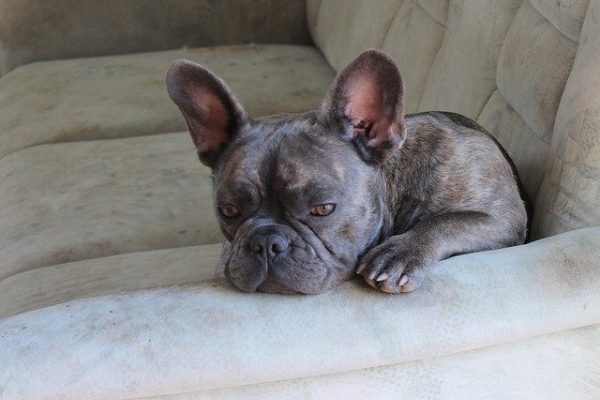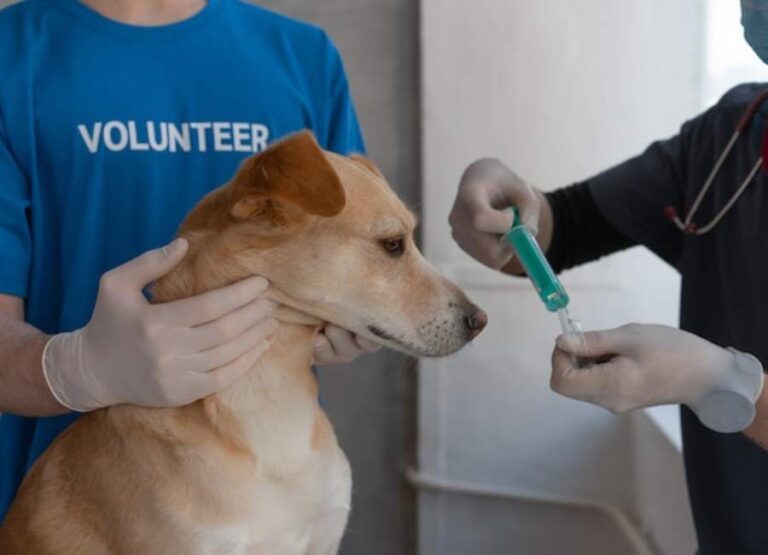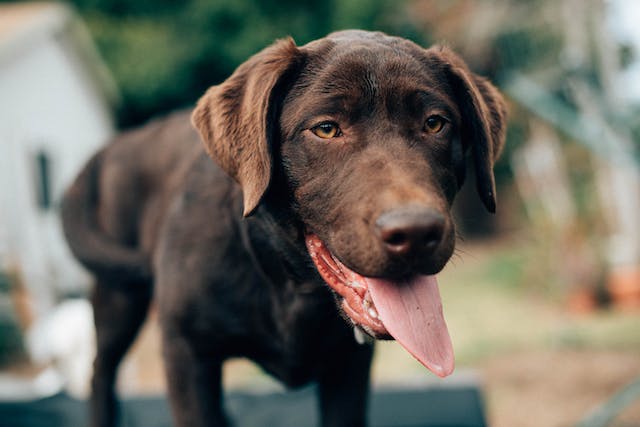16 French Bulldog Separation Anxiety Signs & 15 Ways To Fix Them

As a dog lover with years of experience, I want to look into French Bulldog separation anxiety and common ways to avoid it.
We will also look into common symptoms of French Bulldogs separation anxiety which is how to identify it.
Let me point out that French Bulldogs are prone to separation anxiety, and over 95% of the time French Bulldogs have separation anxiety it’s the fault of the owner.
This is because French Bulldogs were selectively bred to be human companions, which means they should always be beside their owners.
If you are the types that have a 9 to 5 job and can’t hire a pet sitter, then French Bulldogs are not for you, that been said, let’s get down to why you are here.
Understanding French Bulldog separation anxiety
Separation anxiety in French Bulldogs is a disorder in which a French Bulldog becomes distressed and displays behavioral issues when separated from its owner for a given period of time.
Separation anxiety in French bulldogs usually appears within minutes of the owner’s exit and can lead to aggressive behaviors.
Separation anxiety in French Bulldogs develops over a period of time, not suddenly, although the symptoms appear as soon as the condition is triggered.
It is unknown why some small dogs experience separation anxiety while others do not, however, separation anxiety does affect all French Bulldogs if left unattended over a given period of time.
Generally, dogs that spend a lot of time alone or have a history of abandonment or mistreatment are more likely to develop separation anxiety.
Even if they are only left alone for a short period of time, some dogs have a disposition that might cause separation anxiety.
Why do French Bulldogs get separation anxiety?
French Bulldogs are prone to separation anxiety because they were selectively bred to be human companions that only thrive on human companionship they are always happy to show affection when they are around their owners.
Read more about: 35 Top Facts About French Bulldogs You Should Know.
Symptoms of separation anxiety in French Bulldogs
Here are the common symptoms of separation anxiety found in French Bulldogs:
Destructive chewing
The major causes of destructive chewing in French Bulldogs are depression, frustration, anxiety, stress, and loneliness, all of which can be triggered by separation anxiety.
If your Frenchie is chewing everything he sees then something is wrong do not ignore it might be a sign of separation anxiety.
People will tell you to spray places you don’t want your Frenchie to chew or put away your valuables and electronic cables.
But the truth is that you are not paying attention to the needs of your Frenchie, why not find out the causes of the destructive chewing and fix it, once and for all rather than spraying or hiding stuff.
You can also get things your Frenchie can chew on if you want, and that will keep your pup away from your items.
Excessive barking
Excessive barking in French Bulldogs is caused by depression, frustration, anxiety, stress, and loneliness, all of which can be triggered by separation anxiety.
Just like we said, separation anxiety in French Bulldogs builds up over a range of time but can manifest within minutes of the owner’s departure.
Your French Bulldog may bark excessively on your departure to work or anywhere, this is because he is afraid of being alone.
Even though French Bulldogs are talkative, but that is when they are with their owners, or when a stranger is around.
So, pay attention to your French Bulldog when he starts to bark unnecessarily more than they usual. Because Frenchies can not be left alone for too long.
Attempting to escape
Your Frenchie may attempt all he can to get out of the house and find you when stressed out.
They’d pound his head and teeth against the crate bars, injuring him in the process, all in the name of forcing him to go because he was nervous.
Whenever you notice your French Bulldog trying to escape when you are leaving the house, don’t ignore it.
That is a serious situation, showing your French Bulldog is afraid of being alone, which leads to separation anxiety.
Excessive digging
One of the primary reasons for your French Bulldog digging your backyard is mainly due to separation anxiety.
They dig to keep themselves busy since they have no one at home, or they have nothing else to do.
Therefore, any day you come home and found your French Bulldog is digging in your backyard, you need to take action.
That is a clear sign your French Bulldog has nothing to do and will get worse if you ignore it.
Excessive scratching of doors or walls
Separation anxiety in French Bulldogs leads to frustration and depression, both of which can lead to unnecessary scratching of doors or walls.
When you leave home for work and your French Bulldog has separation anxiety, you will notice his scratching the exit door you used.
You may also come back and notice your Frenchie is scratching your walls, this is clearly a sign of anxiety which could be caused by being alone.
Read more about: How To Take Care Of A French Bulldog: Complete Guide
Constant loss of appetite
One of the indications of anxiousness in French bulldogs is a constant loss of appetite which is always clear to see.
A dog’s appetite may wane, and he may begin to lose weight.
If you constantly ignore it, then you may spend more time with your vet later down the road.
If this problem persists, it might jeopardize your Frenchie’s essential functions and can develop other unnecessary French bulldog behavior issues.
Chewing on their paws
Chewing of paws is always caused by many things, but two of the most common reasons are separation anxiety and the side effects of medication.
If you are sure your French Bulldog is not on any form of medication and you constantly see your French Bulldog chewing his paws then it can be anxiety.
French Bulldogs chew paws out of depression, frustration and anxiety. Sometimes they do this because they have nothing to do.
Excessive whining
If your French Bulldog is disturbed or anxious or suffering from separation anxiety, he may whine at any time.
The whimpering is frequently followed by pacing if the stressor is anything like loud noises that your dog can’t get away from.
If your French Bulldog isn’t crying because he has to go outdoors or is in pain, it’s most likely stress.
When dogs are stressed due to separation anxiety, they frequently lose control of their whining, which is a natural response.
It is, however, an indication that something in your French Bulldog’s surroundings is causing concern. Whining can sometimes be a symptom of anxiety.
Urinating or defecating
If your Frenchie is totally toilet trained, but your French Bulldog always has an accident every time you leave the home.
This is a very good indication that your Frenchie is experiencing anxiety while you are gone.
Your puppy or adult French Bulldog may even begin to consume his or her own feces due to anxiety.
This symptom can be quite unpleasant, but there are things you can take to avoid it or simply fixing the main cause which could be anxiety.
Shaking or shivering
Shaking or shivering could be caused by a number of things like fear, side effects of medication, illnesses, hunger, old age as well as separation anxiety.
When you are sure your French Bulldog is cleared of the above-listed issues associated with shaking, then you can think of separation anxiety.
Read more about: Do French Bulldogs Bite: 10 Bite Triggers & 9 Solutions
Excessive hiding
Excessive hiding in French Bulldogs can mean a range of things, but the two clear signs are separation anxiety and fear.
When a Frenchie is anxious, he may look for a restricted place in the house or a portion of the owner’s clothing that carries his smell.
Your dog may spend hours curled up beneath the table or somewhere in the home to relieve himself.
If you start to notice your French Bulldog hiding unnecessarily, you should not ignore it, try to find out why.
Excessive yawning and panting
Dogs do not yawn in the same way that humans do. Excessive yawning, which can be followed by panting, maybe your dog’s way of relieving tension.
If your French Bulldog is yawning and panting excessively, don’t ignore it and tell yourself that it’s normal for dogs to do so.
Unnecessary freezing
When your French Bulldog freezes or gets rigid when you arrive home from work or are ready to leave, it means he is frightened about being alone.
Freezing in your French Bulldog unnecessarily may be highly harmful to both you and your dog.
It’s a sign that your French Bulldog is stressed out and won’t be able to handle the situation, and a bite might be the next step.
Excessive freezing in small breeds like French Bulldogs is a common indication of anxiety that should not be disregarded.
Excessive Growling
Your French Bulldog utilizes growling as a means of communication because it can’t tell you whether it’s angry or uncomfortable using words.
Your French Bulldog’s growling is a normal way for him or her to show how unsettled he or she is over time.
It might mean that someone is violating their personal space, suffering from separation anxiety, that they are afraid, or that they are bothered by anything.
It isn’t necessarily meant to be aggressive, but it is usually an indication that your dog is uncomfortable.
Give your French Bulldog some space if they are growling over food, for example, so they may eat in peace.
But if they are growling because you are leaving don’t ignore them.
Following owner up and down during exit
Whenever your French Bulldog starts following you up and down if you are about to leave home, that means your pup is afraid of being alone.
This is a clear sign of separation anxiety and should not be ignored.
Excessive sleeping
Something is wrong when your Frenchie, who typically sleeps for 6 to 8 hours at a time, sleeps for a long length of time, such as 10 hours in a row.
If your dog’s behavior has suddenly changed, and he prefers to hide and sleep alone, it’s a clear sign that something is wrong.
Either they aren’t feeling well or they are experiencing Separation Anxiety.
Read more about: French Bulldog Barking At Night: 14 Causes & Solutions
How to fix and prevent separation anxiety in French Bulldogs
Here are the common ways to fix, stop or prevent separation anxiety in French Bulldogs:
Establish and stick a daily routine
Create a walking, gaming, and eating routine. Your Frenchie will be more at ease since he will always know what to expect.
This means your French Bulldog will be busy most of the time and will never be bored or feel your absence.
Create and follow a daily schedule that works for you and your French Bulldog, and always assign responsibility to your French Bulldog.
When it’s time for a meal, for example, don’t skip meal time for other activities, continue practicing it until your French Bulldog gets used to it.
Having a routine that works for you and your French Bulldog help to prevent most forms of anxiety.
Bring in a companion pet
French Bulldogs are prone to separation anxiety because they were selectively bred to be a human companion and thrive only on human companionship.
One of the best ways, if not the best way, of preventing separation anxiety in French Bulldogs is to get a companion pet as fast as you can if you are not always available.
It will be difficult for your French Bulldog to develop separation anxiety if you have a companion pet. So get a companion pet to prevent separation anxiety in your French Bulldogs.
Hire a pet sitter if you are always away
Let’s say you are always away for most of the day, it will be helpful to hire a pet sitter if you are always away for your French Bulldog to prevent separation anxiety.
A pet sitter for your French Bulldog will cost around $20 – $40 depending on your state and arrangements.
So when you are away the pet sitter will always come to check on your French Bulldog till you get home.
Get automatic treats dispenser
This is a good way to keep your pup busy while you are away from home, French Bulldogs love treats and food, you can use that to keep them busy.
Remember, too many treats are also a problem because they can cause unnecessary health challenges in French Bulldogs.
So, moderation is the key, you can set the timing of the dispenser to drop some treats for your pup over a range of time that works for you.
Start the treats’ dispenser training when you are at home so that when you leave your pup and sit, then wait for treats to drop.
This will keep him busy, one treats at a time. You can try out different timing and see what works for you and your pup.
Leave the radio or television on
Another common way of helping your dog to prevent separation anxiety is to train your dog to associate watching TV or dog show with calmness.
There are lots of dog show you can put for your pup to help them relax and watch while you are gone.
You should get as many dog movies as you can and allow your pup to choose the ones that keep them busy and calm.
Read more about: Why Do French Bulldogs Sleep So Much: 10 Reasons & More.
Begin by taking shorter absences
If you really must leave your French Bulldog at home alone all day, another option is to start with brief absences.
Take your keys and leave the home for 5 to 10 seconds, leaving your French Bulldog alone.
See how your French Bulldog is doing while you’re gone through a tiny hole.
Return home through the front door, appearing quite normal, before your Frenchie may get into trouble.
Do not enter the home if your French Bulldog begins to growl and howl; instead, wait until they have calmed down.
Use a remote camera to see and talk to your Frenchie
Another option is to purchase one of the Amazon-available remote cameras.
That way, you can see and chat with your dog while you’re at work. This might provide you with a great deal of peace of mind.
These dog cameras have outstanding reviews on Amazon, and they might be a perfect option if you plan on leaving your French Bulldog at home alone for an extended length of time.
Introduce a treasure hunt method
Treasure hunt is a sort of game that keeps your dog busy while you are away.
You can get a good pack of treats and hide it from end to end of your dog area, this will keep your pup busy and searching all day long.
Again, moderation is the key because too many treats are bad.
Begin an appropriate crate training program
Crate training is an important training method that may help with a variety of puppy issues, including separation anxiety.
When you’re gone for an extended period of time, crate training can give your dog a safe, quiet area to relax.
The key is to get the dog to connect to his crate with positive things like chew toys and food-releasing puzzle toys, so he enjoys spending time inside.
When left alone, some dogs feel safer and more at ease in their crate, so keep an eye on your puppy’s behavior to see whether he settles down or if his anxiety symptoms worsen.
Read more about What Human Food Can French Bulldogs Eat: 15 Best & How To Feed.
Invest in some antianxiety products
You may always invest in anti-anxiety products to assist your French Bulldog cope with anxiety.
Here are a few examples of common antianxiety products:
- Dog anxiety jacket
- Dog-calming collar
- Antianxiety beds
Exercise and play more with your French Bulldog
The brain of your French Bulldog is kept active by providing varied stimuli, releasing energy, and interacting with other canines.
Participate in sports with your French Bulldog if they are naturally enthusiastic, such as agility training.
You’ll strengthen your relationships while also benefiting your and their health.
However, be cautious when playing with your French Bulldog since, owing to their small snout, they are prone to overheating and respiratory issues.
Create a stress-free and comfortable environment
Create a relaxing environment for your dog. Ideally, you should carry the same bed, blanket, or mat with you whenever you visit a potentially stressful place.
Reward relaxing activities on the mat on a frequent basis, even when stress levels are low, to help your dog link the mat with relaxation.
This gives them a safe place to go when they leave the house, go to the vet, or are confronted with anxiety triggers.
Try the no touch, no talk, no eye contact method
When you leave for the day or return, don’t make a big deal out of it.
According to Cesar’s Way, you’re signaling to your dog that the time apart isn’t a huge issue this way when you leave home.
It’s just another day at the office! You may need to rehearse the rule for five minutes or up to an hour before you leave and when you return, depending on the intensity of the dog’s fear.
Desensitization and Counter-Conditioning
Teach your puppy that there are benefits to being separated. Begin by leaving him for small amounts of time and progressively increase the time you spend away from him.
If your puppy is already conditioned to go into stress mode when he realizes you’re leaving him, consider providing a high-value treat that he adores and that you exclusively use for essential lessons and incentives to counteract that behavior.
If you give him a special treat shortly before you leave, he could start to anticipate your departure.
You may also make your departure routine less stressful for your puppy by desensitizing him to the indications that you’re going to leave.
See an animal behaviorist or your vet
Consult your veterinarian if your French Bulldog is experiencing any sort of anxiety or signs of separation anxiety.
As soon as you detect any of the indications described on this page, contact your veterinarian.
If you are unable to see a veterinarian, you might seek help from an animal behaviorist in your area.
I hope your question about French Bulldog Separation Anxiety was answered to your understanding!!!
Read more about: Can French Bulldogs Eat Carrots: How To Feed & 7 Benefits





![Why Is My Dog Suddenly Sneezing So Much [8 Reasons] Why Is My Dog Suddenly Sneezing So Much](https://petcreeks.com/wp-content/uploads/2023/04/Why-Is-My-Dog-Suddenly-Sneezing-So-Much-768x555.jpg)
